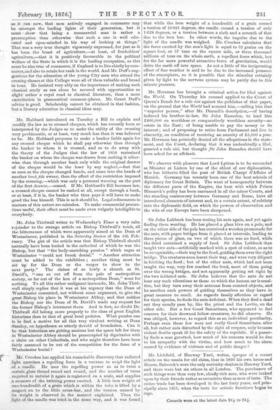Sir John Lubbock has been testing his ants again, and
yet again finding them wanting. He has placed a glass hive on a pole, and on the other side of the pole has contrived a wooden promenade for the ants, with paper bridges from it placed at intervals, leading to three pieces of glass, on two of which there was no food, while the third contained a supply of food. Sir John Lubbock then taught two ants—artificially marked with a spot of colour, so as to be recognisable,—their way to the food, guiding themover the right bridge. The creatures soon learnt their way, and were very diligent in fetching the food ; but of the other ants, , which had not been taught the way, very few reached the food, most of them going over the wrong bridges, and not apparently getting set right by the two initiated ants. Sir John believes that the ants do not hear any such vibrations as those to which the human ear is sensi- tive, but they turn away their antennse from scented objects, and he ascribes such powers of guiding themselves as they have in great measure to smell. As regards family affection or regard for their species, he finds the ants deficient. When they find a dead ant they usually paw by, like the priest and the Levite, on the other side. But a few Good Samaritans, who appeared to feel concern for their drowned fellow-creatures, he did observe. He was obliged, however, to regard this as an individual peculiarity. Perhaps even these few were not really Good Samaritans, after all, but rather ants disturbed by the sight of corpses, only because violent deaths speak ill for the safety of the republic. If a passer- by finds a man garotted, how much of his concern would be due to his sympathy with the victim, and how much to the alarm caused by evidence of violence and of public danger?


































 Previous page
Previous page